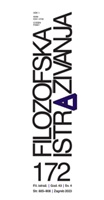Heisenbergova kritika principa kauzaliteta sagledana u svjetlu Kantove distinkcije opažajnih i iskustvenih sudova
Heisenberg’s Critique of the Principle of Causality Viewed in the Light of Kant’s Distinction between Perceptual and Experiential Judgments
Author(s): Saša LaketaSubject(s): Epistemology, Contemporary Philosophy, Philosophy of Science
Published by: Hrvatsko Filozofsko Društvo
Keywords: causality; Werner Heisenberg; universality; necessity; predictability; Immanuel Kant; time; observation; experience;
Summary/Abstract: In this paper, we will question Heisenberg’s claim that the unpredictability of the experimental findings of quantum physics also affects the self-evident attitude about the universal and necessary nature of the principle of causality. We will try to answer the aforementioned problem by confronting Heisenberg’s criticism of Kant’s position on the universal and necessary/absolute nature of the principle of causality with Kant’s distinction between perceptual and experiential judgments. The distinction between perceptual and experiential judgments reveals that even in Heisenberg’s experimental results that indicate the smallest degree of expectation, predictability, or uniformity of natural events, universal and necessary conditions of knowledge to which Heisenberg denies absolute value still preexist.
Journal: Filozofska istraživanja
- Issue Year: 43/2023
- Issue No: 04/171
- Page Range: 705-723
- Page Count: 19
- Language: Croatian

